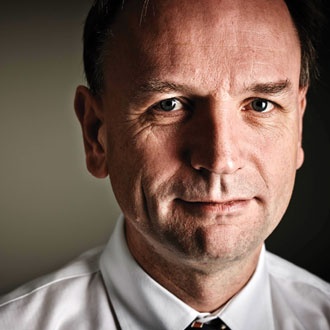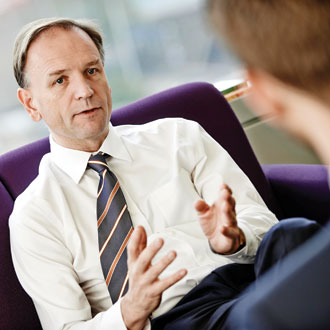
It would almost be too easy to make Simon Steven’s headquarters a metaphor for the organisation he heads up – austere, characterless and lacking imagination.
But the man himself is brimming with energy. ‘Welcome to the paperless NHS,’ he jokes as we sit down in his office – a blank glass box containing a table covered with a dozen piles of paperwork.
Mr Stevens has been NHS chief executive for eight months and holds one of the toughest remits in the civil service. He must square the circle of taking forward a health service traumatised by reorganisation, but in need of urgent change to cope with a rising workload and continued budget restraint.
His answer to this problem has been to publish the Five Year Forward View for the NHS, with major changes to the role of GPs at its heart.
‘There are parts of the country where there is a very substantial mismatch between the care needed and the existing funding and model,’ he explains. ‘Places like Staffordshire, parts of Cumbria, and Medway.’
‘If you can’t answer the exam question as posed, then it’s time to change the exam question. We need to put into play a range of options that were previously considered verboten in the NHS.’
‘Next year, I want us to begin to make more progress on premises investment if we can’
Simon Stevens, NHS chief executive
These ‘forbidden’ options include smashing the barriers between GPs and hospitals, with practices employing consultants and hospitals being able to set up GP practices.
He plans for GP practices to become ‘multispecialty community providers’ that will provide much more care outside of hospital, and integrate more closely with pharmacy, mental health and community services.
A brave vision – but how does he plan to implement it? ‘There are places where these new models are more or less in place, but they need extra resourcing and the freedom to help them deliver,’ he says.
‘We will use the next four or five months to kick off a process, so places can say: “Here’s what we want to do, how we’re going to do it, and how it will help care in our area”.’
That sounds great in principle, I say, but most GPs would point out that they need help now. ‘Ah,’ he says, sitting forward in his seat. ‘That is why we have just put out another £300m for CCGs that can be used to support GPs over this winter.
‘I would hope that conversation is happening. If it’s not, then GPs should be on to their CCG governing body about how to do that. Also, co-commissioning kicks in from April, and that gives us a new set of tools.’
Mr Stevens cites the concessions over the withdrawal of MPIG and the slowing of the PMS contract reviews as evidence that he is listening to GPs’ concerns. He also promises to address the chronic lack of investment in practice premises.
‘Next year, I want us to begin to make more progress on premises investment if we can. I’ve talked to the GPC and the RCGP about this and I know that even if GPs were to be funded for more services, there are physical constraints because there is not an extra room in the surgery to do them.
‘Nobody can wave a magic wand, and it will take a number of years to invest in general practice infrastructure to get the kind of modern services that people want. But we’re on to it.
‘I don’t know exactly what the resources will be for next year – it’s dependent on the Government. But we do have some discretion and we’d like to use it in that direction.’
At this point, I feel I can no longer ignore the elephant in the room. Much of Mr Stevens’ plans rely on the goodwill of GPs, but this has largely been burned away by the high-handed treatment of practices by NHS England. Does he think this needs to change?
A sharp intake of breath. ‘If there are particular instances we will look at those, but NHS England has to be the steward of taxpayers’ resources.’
He cites a Pulse investigation into NHS England’s GP list validation scheme from earlier this year as an example of where managers have to make unpopular decisions to safeguard the public purse.
‘Yes, we do need goodwill, but we also have to answer to Parliament and the public for the way payments are made.’ No one can argue with that, I concede, but it is the heavy-handed application of policy that is causing so many problems. He says: ‘If there’s a way of getting a sober-headed sense of what the points of friction are, I would certainly be interested in hearing about them.’
Mr Stevens is not afraid to take on vested interests. One of his first initiatives in post was to call for ideas on how CCGs can share responsibility for commissioning local GP services.

These plans have progressed and CCG leaders can now opt for one of three levels of co-commissioning responsibility from January, the most extreme being taking on almost all the GP contract and the opportunity to develop local replacements for DESs and the QOF.
This has met vehement opposition from the GPC, which has warned it would be an ‘absolute disaster’ to move away from a national GP contract. But Mr Stevens insists there will still be a role for the national negotiations.
He says: ‘I’ve heard people make various predictions about this. One is that the GMS contract will remain a core option, but other things like enhanced services will increasingly be used. I can see why that makes sense.
‘Can I imagine a time in the near future where there won’t be some kind of core contract? No, I don’t think that’s likely. It’ll continue to be an option. About 55% of GPs are on GMS contracts. Whether the right answer is to have 55, 65 or 45, that is a choice for GPs.’
Mr Stevens came into the NHS through its graduate training scheme in 1988, but spent 10 years in senior positions at US private healthcare giant UnitedHealth.
He says: ‘I’ve seen the good, the bad and ugly of healthcare systems all round the world and there are things NHS managers could learn about the way care is organised in other places.
‘But on the other hand, the part of the NHS that most people internationally think is really good is general practice: electronic health records, the proactive primary care population orientation, combined with personalisation.
‘There are fewer lessons from abroad that general practice can learn compared with other parts of (NHS) services.’
Read the NHS chief executive Simon Stevens’ CV in full
Quick-fire Q&A
What is the ‘new deal’ for GPs you are calling for?
We’ve got to recognise general practice has lost out in funding to acute care and that the changing needs of outpatients mean we need new style of primary care.
Are CCGs ready for full responsibility for commissioning GP services?
I think every CCG can be involved in dialogue with NHS England locally. I don’t see why most shouldn’t have some sort of formal joint commissioning arrangement. How many want to do full delegation [of GP commissioning] is a matter for them.
Will the dementia identification DES be renewed?
This is just through to March so it’s a one-time catch-up opportunity for practices.
Do you intend to review GPs’ independent contractor status?
There’s a set of choices for GPs and their choices will continue to evolve. For 15 years there has been a range of choice, and people vote with their feet.
Are you shocked by Pulse’s figures on potential practice closures?
The practice unit is an organisational building block; it’s the number of GPs we want to expand. If there are going to be five GPs together rather than two, it means the number of practice units will continue to evolve.
Pulse October survey
Take our July 2025 survey to potentially win £1.000 worth of tokens














